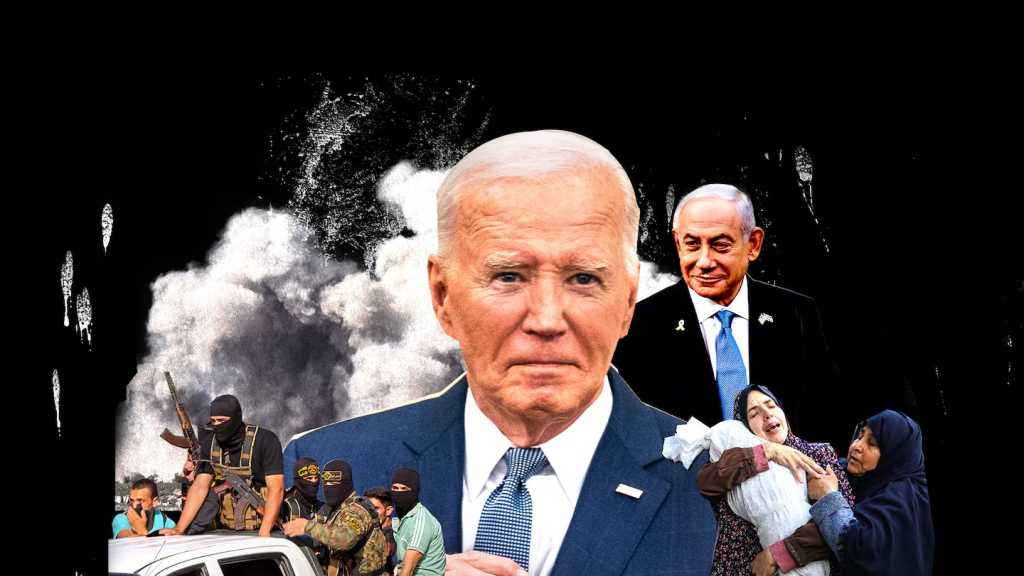Biden’s ‘Bear Hug’ of “Israel”: A Diplomatic Failure

By Mohammad Hammoud
In the Middle East, few diplomatic relationships have attracted as much scrutiny and controversy as that between the United States and “Israel”. US President Joe Biden's administration adopted a strategy of unwavering support for “Israel”, often described as a “bear hug” approach. This strategy, based on the belief that positive inducements could effectively restrain “Israeli” actions in Gaza, has ultimately proven to be a diplomatic failure. As the conflict escalates, the consequences of this approach have become increasingly dire, pushing the region to the brink of all-out war. This essay, drawing on articles from Foreign Policy and The New York Times, argues that Biden’s steadfast support for “Israel” has not only undermined US foreign policy objectives but has also contributed to a catastrophic escalation of violence that threatens regional stability.
The Initial Response and Policy Objectives
In response to Al-Aqsa Flood in October, Biden traveled to “Tel Aviv” to meet with “Israeli” Prime Minister Benjamin Netanyahu, reaffirming the US commitment to Israel's security. The administration outlined four primary objectives: supporting “Israel's” military campaign against Hamas, facilitating hostage releases, mitigating harm to Palestinian civilians, and preventing a broader regional conflict. However, one year later, the situation has deteriorated significantly. Over 42,000 Palestinians have lost their lives, and Gaza faces one of the worst humanitarian crises of the century. Despite extensive military support from the US, “Israel” has failed to eliminate Hamas, and negotiations for hostage releases have stalled.
The Consequences of Unconditional Support
The ramifications of the Biden administration's diplomatic strategy became apparent as violence intensified. While initially seeking to prevent an all-out war, the administration's failure to impose any “red lines” regarding “Israeli” military actions contributed to escalating violence. Previous administrations have shown deference to “Israel”, but Biden's approach has eschewed meaningful pressure on the “Israeli” government. This has resulted in a US policy that is increasingly disconnected from on-the-ground realities and the administration's stated objectives. In the early months of the conflict, the US rejected calls for a cease-fire and vetoed multiple United Nations Security Council resolutions. As civilian casualties mounted and humanitarian conditions in Gaza worsened, the administration's lack of urgency became increasingly evident. Despite warnings from US War Secretary Lloyd Austin about the risk of strategic defeat due to high civilian casualties, the Biden administration continued to fast-track military aid to “Israel”.
Human rights organizations have condemned “Israel's” actions, with reports suggesting that bombing campaigns and blockade tactics amount to using starvation as a weapon of war. The dire humanitarian conditions—exacerbated by the US's failure to take decisive action—have led critics to argue that the US has acted as an enabler of “Israeli” military excesses rather than a mediator striving for “peace”.
Incoherence and Inaction
As the war dragged on, the incoherence of US policy became increasingly apparent. In the face of “Israeli” airstrikes that reportedly killed aid workers—including US citizens—the Biden administration’s threats lacked potency and credibility. While verbal warnings about changing US policy were issued, little shifted in practice. For instance, extraordinary measures such as aid airdrops and constructing a floating pier for humanitarian aid were abandoned due to operational failures, leaving the plight of civilians in Gaza unaddressed.
The International Court of Justice's ruling citing a "plausible" case for genocide in Gaza starkly highlights the implications of uncritical support for “Israel”. The absence of effective leverage and the refusal to apply meaningful pressure on “Israel” have rendered the US a complicit actor in the cycle of violence rather than a credible “peace” broker.
Conclusion
As Biden’s ‘bear hug’ approach has unfolded over the past year, it has become painfully clear that unconditional support for one side in this multifaceted conflict only exacerbates an already volatile situation. The administration's failure to pair its support for “Israel” with serious diplomatic measures and humanitarian considerations has resulted in dire consequences for both Palestinians and the broader Middle Eastern populace. With the region now on the brink of all-out war and the threat of Iranian involvement looming large, Biden’s approach not only falls short of achieving its stated objectives but serves as a cautionary tale about the perils of unilateral foreign policy decisions. It is imperative for the US to recalibrate its strategy, adopting a more balanced and humane approach that genuinely seeks peace and stability rather than merely upholding military allegiances.
Comments




